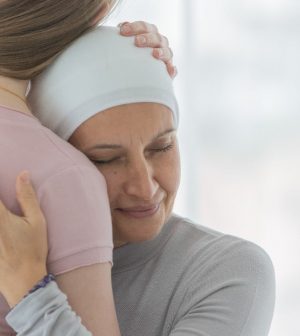- Could Your Grocery Store Meat Be Causing Recurring UTIs?
- Are You Making This Expensive Thermostat Error This Winter?
- Recognizing the Signs of Hypothyroidism
- 10 Strategies to Overcome Insomnia
- Could Artificial Sweeteners Be Aging the Brain Faster?
- Techniques for Soothing Your Nervous System
- Does the Water in Your House Smell Funny? Here’s Why
- Can a Daily Dose of Apple Cider Vinegar Actually Aid Weight Loss?
- 6 Health Beverages That Can Actually Spike Your Blood Sugar
- Treatment Options for Social Anxiety Disorder
Late Cancer Diagnosis Biggest Health Concern for Most, Poll Shows

When it comes to health worries, cancer leads the way, a new poll shows.
The University of Cambridge poll included 2,000 adults who said their biggest concern is getting diagnosed with cancer when it’s too late to treat it. Seven in 10 respondents have that fear, while 52% fret about the impact of a cancer diagnosis on loved ones.
“Cancer affects one in two of us and understandably induces fear in patients and their families,” said Richard Gilbertson, director of Cancer Research UK Cambridge Center. “People are worried that treatments won’t work or that side effects will be terrible, but also what their diagnosis will mean to their family.”
Four in 10 respondents worry about getting access to the right treatment and 36% fretted about treatment side effects, the poll showed.
Asked what would make them less fearful of a cancer diagnosis, 6 in 10 said “knowing that the form of cancer I have is treatable.” Just over half (51%) said “knowing we are better at catching cancer early enough to treat.”
“Outcomes can be completely transformed — better survival and less invasive treatments — if the cancer is diagnosed early enough,” said Rebecca Fitzgerald, director of the Li Ka Shing Early Cancer Institute at the University of Cambridge. “That’s why a lot of our focus now is on understanding cancer at its very earliest stage — years before an individual will develop any symptoms. That way, it may even be possible to prevent the disease in the first place, or at least catch it when it can be treated.”
Knowing that a lot of people are researching ways to prevent, diagnose and treat cancer is reassuring, the poll found. In all, 32% said this would ease their fear.
When presented with a number of undesirable future events, only one thing was more worrisome than a cancer diagnosis — the death of a loved one (72% versus 64%). That was higher than nuclear war (56%), terrorism (53%) or being a crime victim (52%).
Researchers were surprised that older respondents were significantly less likely to be “very worried” about cancer than younger ones — 14% of folks over 65 compared to 26% of 18- to 24-year-olds and 29% of 25- to 34-year-olds.
Respondents were also questioned about their views on using artificial intelligence (AI) to improve diagnosis and treatment of cancer. In all, just 8% said no way. Meanwhile, 55% favored using AI to speed research into new treatments; 47% to help doctors diagnose cancer; and 41% to help their doctor decide what treatment would work best.
More information
The American Cancer Society has guidelines to help detect cancer early, when it may be easiest to treat.
SOURCE: University of Cambridge, news release, July 14, 2024
Source: HealthDay
Copyright © 2026 HealthDay. All rights reserved.










